#same Supreme Court
Explore tagged Tumblr posts
Text
I think when talking with Americans who are convinced the world will burn alive if you dare question voting for Biden or whatever, it's important to address the strategy of inoculation when it comes to organizing. In particular, voting for Biden in no way guarantees Trump doesn't wind up winning anyway, so inoculation is doubly important, which is to say, these people need to be asked; what happens if Trump wins? They need to say these things out loud. Why is it that such things would happen? What forces that be allow for them? And with that, the question then needs to be asked, what will be done when this worst case scenario inevitably happens? Are they prepared? Because a vote for Biden still leaves the worst case scenario as fully and completely possible, and the "vote blue no matter who" crowd needs to be made aware that they cannot in any way rely on an unreliable and corrupt voting system to hold back the worst case scenario. After all, if you actually care about trans people and immigrants, then you should be doing more than just hoping people will vote, hoping the right old fart in the White House will protect you - you should be organizing your community to fight back against these constant attacks. People fall into this "vote blue no matter who" trap because their anxieties are used to blind them to the fact that they're being played. Inoculation is necessary to calm these anxieties and make it clearer that a vote is less than the barest of bare minimums to actually protecting your loved ones from the very real problems that are making people anxious.
Vote for whoever the fuck you want, I'm Canadian and I don't really care, but stop putting the focus on the vote and the vote alone and start talking with your community members about what you'll do if (and dare I say when) the worst case scenario happens and you have four years without a vote to rely on.
Also like, people are allowed to criticize any and all leaders. That is like, supposed to be the whole freedom of speech thing. If your candidates just suck so much shit that you can't give a reason to vote for them beyond "the other choice is worse," you aren't convincing anybody. Somebody who is not voting for the other option is not going to be convinced to vote differently if said option that they aren't voting for is worse. They will simply continue to not vote. It's not a convincing talking point. It is literally untrue that voting anything non-blue is a vote for red, that's not how politics works and you are sounding increasingly out of touch with reality and increasingly more like the qanon conspiracy guys.
Not sure where this post was going. Just sick of seeing the same cyclical talking points with no progress whatsoever and am dumping my own thoughts on this.
#literally even if Biden wins#the MAGA crowd won't be sitting and waiting politely for 4 years#and every other state will still be influenced by the same Republican forces no matter who is in the federal government#same Supreme Court#for the love of god study how your politics works beyond just the president#even the MAGA chuds do it#make some freaking backup plans#actually join and participate in an organization and not just repeat the campaign slogans of political parties whose meetings you've never#been to#also learn to live with non-US folk criticizing Biden#we have no obligations to like your douchebag leaders#certainly not any more than Americans who constantly talk shit about other world leaders#also Canada is not exempt from this#our talking points are just a bit different here#a little less desperate and anxious and more defeated and apathetic
1 note
·
View note
Text
With less than a week to go, SCOTUS' partisan wing sends the message loud and clear that their attitude towards rubber-stamping outrageously illegal election-interference bullshit is "try and stop us, you jumped-up little shits."
However, in this particular case, you can still vote if Virginia has wrongfully purged you from the voter rolls. As of 2022, VA offers same-day registration and provisional ballots (where you follow up with documention after the fact), as long as you vote in the correct precinct.
Official Virginia page to look up the polling place for your address
Official Virginia same-day registration info
Official Virginia page to check your registration status
Ballotpedia state-by-state info on same-day registration
Ballotpedia state-by-state info on provisional ballots and what happens to ones cast in the wrong precinct
ACLU Know Your Rights voting fact sheet
Multilingual voter protection hotlines (English: 866-OUR-VOTE)
For anyone who became a citizen since their last DMV visit, or who suspects they made an error filing out their paperwork that would have booted them from voter lists, there are still ways to cast a ballot in next month’s elections. Registrars and election workers won’t turn eligible voters away from polls if they wish to utilize same-day registration or a provisional ballot, according to Henrico County Registrar Mark Coakley. [...] With a provisional ballot, voters will still need to follow up with their local registrar office to provide additional documents that can help verify their identity or other facts, like if they are residents of Virginia and the city or county they voted in, and whether they are U.S. citizens or have had their voting rights restored after a previous felony conviction. [...] Coakley said that when using a provisional ballot, voters are also given instructions to help with the follow-up procedures. “They’ll get a letter attached to their provisional ballot, giving them all the information of ‘This is the reason why (you may have this ballot)’ and ‘Here’s the ways to get hold of us to present evidence if you choose to do so,’” he said. Chesterfield County Registrar Missy Vera stressed that same-day registration can happen at any early voting location as well as on Election Day, which is Nov. 5.
#us politics#virginia#voter suppression#politics#election 2024#us supreme court#scotus#supreme court#provisional ballots#same day voter registration
443 notes
·
View notes
Text
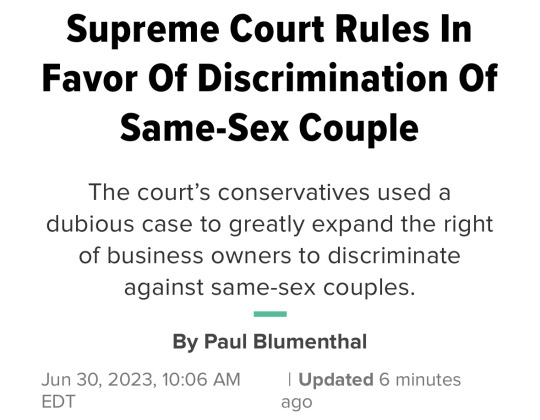
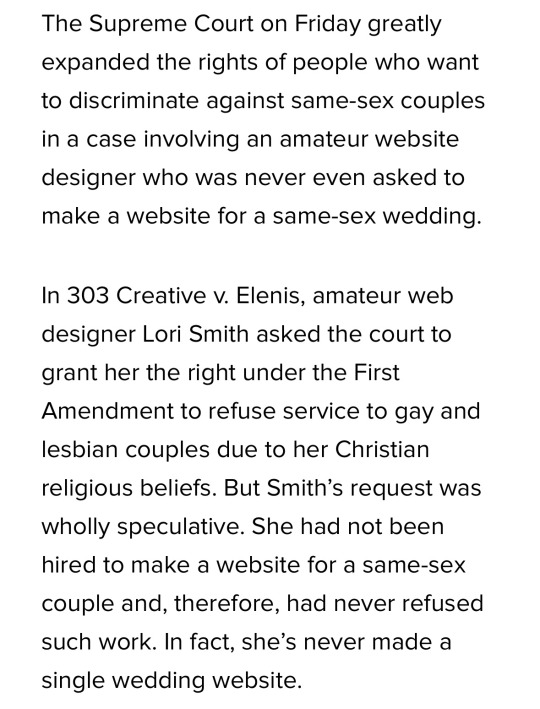
Source
#pride month#politics#us politics#government#the left#lgbt#same sex couples#lgbt rights#bigotry#discrimination#progressive#current events#news#scotus#Supreme Court#important
2K notes
·
View notes
Text
Still think your vote doesn't matter?
#equality#same-sex#marriage#gay#lesbian#transgender#asexual#bisexual#pansexual#LGBT#LGBTQ#LGBTQIA#SAGA#gender#identity#human#civil#rights#afraid#homophobia#transphobia#Supreme Court#SCOTUS
52 notes
·
View notes
Text
THEY FUCKING OVERTURNED THE CHEVRON DOCTRINE WHAT THE FUCK
WE KIND OF NEED THAT
It's only, like, the ruling that gives the EPA (and all other federal agencies) the power to define environmental law when actual laws aren't specific enough. Tell me, do you want lead in your water?
If not, you'd better move out of the US!!!
This is appalling. We want experts handling our water and air quality, not politicians who have no idea what they're talking about!!
Call your senators. Call your house representatives. Hell, send hate mail to the asshats who overturned Chevron (John Roberts, Clarence Thomas, Amy Coney Barrett, Samuel Alito, Niel Gorsuch, and Brett Kavanaugh). This is appalling.
Source 1 | source 2
#im really mad about this#chevron doctrine#supreme court#america fucks it up again#biden shouldve packed the court after dobbs v jackson#because it was the same balance of justices#i hate this country
37 notes
·
View notes
Photo

Good news in voting rights coming out of Montana! 🎉
Yesterday, the Montana Supreme Court struck down four major voter suppression laws passed in 2021, which:
🔹Eliminated same-day voter registration in most cases
🔹Made it more difficult to vote with a student ID
🔹Outlawed absentee ballots for new voters who would turn 18 by Election Day
🔹Banned paid ballot collection and reduced other forms of ballot return assistance
The Court’s decision is a MAJOR victory for Montana voters, specifically Native American voters, young voters, and voters with disabilities who would be disproportionately impacted by these laws.
#montana#court#voting rights#good news in voting rights#good news#montana supreme court#same day voter registration#student id#absentee ballots#election day#native american#gen z#voters
78 notes
·
View notes
Text
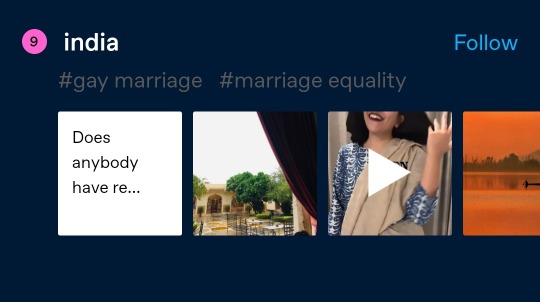
Good to see this trending even though I have no idea why suddenly today but—
A historic debate on marriage equality and legalising same-sex marriage is underway in the Supreme Court of India. The Union govt. is against it of course but the SC judges and the lawyers representing the petitioners are very progressive. The recordings of the live hearings are up on youtube and worth watching because the arguments in favor are just ✨chef's kiss✨ The verdict is yet to be out but I'm really hopeful. Anxious but hopeful. So far the CJI's statements point to a positive outcome for the queer community but let's wait and watch. It's gonna be epic🌈
#marriage equality#marriage equality hearing#same sex marriage#India#supreme court hearing#indian queer community#queer india#supreme court of india
270 notes
·
View notes
Text
Visiting my besties means access to a television, which means enduring mainstream media coverage of the presidential campaign, which means witnessing how completely gop originating propaganda has infused news pundits, and the effects of simple repetition and selective omissions has on lifelong liberal Democrats. Absolutely stunned at all the moronic suggestions about how he should just step down and let harris take over from ostensibly informed allegedly liberal pundits. She has no funding, biden's can't be transferred to her, no media presence and it would make the party as a whole look incompetent and unreliable regardless of her qualifications.
#politics#and that's called#propaganda#it works through repetition#it doesn't matter who's repeating it#or why#the same way#brand recognition works#republican voters don't need#to win#it's enough to divide#the democratic vote#and send the final vote#to the supreme court#which is the crucial reason#you don't vote 3rd party#in a presidential race
22 notes
·
View notes
Text
now im not saying anything about whether or not you ~should~ vote for the immigrant-hating palestinian-killer who happens to be a "democrat" but i swear if i see one more post about how "if everyone had just voted! trump never would have gotten in office and we don't want that to happen again!!" i'm gonna go chimp mode
trump didn't even win the popular vote, you idiots. am i the only one who remembers the weeks of protests because of it?
#the queen of trash has spoken#please do not discourse with me i am but a humble farmer#like this is the weirdest piece of copium ever#and maybe it's because votepilled libmaxers have memory-holed themselves#into misremembering one of the biggest issues in our 'democratic' system wherin a small portion that doesn't even represent the population#is allowed to overrule the population in deciding our literal national leader#(because i think recognizing that america is not a democracy would instantly fry some of these folks brains)#but it boggles my gd brain that ppl will eqaute not voting to trump winning to... Everything that's been going on#which don't get me wrong. there were some abhorrent policies introduced during his reign. supreme court justices etcetc#(which don't even get me started on scotus)#but. myfriends. i'm sorry to say this. but we the people didn't want him then either lmao. i made apost about it in 2020 too because these#ppl come out of the woodwork every five years like Fuckin cicadas#and it's the same fucking shit every fucking time.#A N Y W A Y#vote locally if you can; be verbal and active locally; protest dissent and organize locally#but for the love of god. it was eight years ago can we not collectively remember reality 8 years ago?
25 notes
·
View notes
Text
The latest 5-4 episode, on Hans v Louisiana, highlights a big problem with the history of the Supreme Court in the U.S., which is that a lot of Supreme Court decisions are the product of really specific political pressures--in this case, the lack of political will by the federal government in 1890 to enforce federal power against the Southern states thirteen years after the Compromise of 1877--for which the Court often acts as a release valve. But, because of the nature of the court and the structure of American law, these high-context political decisions have to be framed as eternal and general principles of law, which exert a heavy influence on later decisions of the Court. Sometimes, as with Hans (which made enforcement of civil rights more difficult) this might be consonant with the political outlook of the original decision, but sometimes it's just complete chaos. Cases like Bush v Gore that have no systematic principle behind them, but nevertheless have to be framed that way, to the detriment of future case law.
I don't know that this is a fully solvable problem! Certainly the small size of the Supreme Court introduces more variability into its decisions; that plus its highly politicized system of appointments makes it a really obvious place to fight for power; and the lack of a clean separation between its role as an appellate court and its role as a constitutional court muddles things further. But even if you could go back in time to expand the court massively, have cases heard by randomly-selected panels, split off the constitutional function into a separate court, and try to implement some kind of non-partisan appointment commission (all of which would require significant constitutional changes), I don't think you would necessarily get a different outcome in Hans, just because of how fundamentally apathetic the federal government was at the time to political dysfunction in the South, and how clearly they had demonstrated an unwillingness to actually follow through with the premise of Reconstruction.
I'd say that the thing that might help most in preventing decisions like Hans becoming millstones around the neck of future generations would be a willingness to call out obviously political bullshit masquerading as timeless legal principles, but I think nowadays people are pretty willing to do that. Bush v Gore, DC v Heller, Merrick Garland, Clarence Thomas's corruption scandals, and various other cases and stories have been a sharp reminder in recent years to anyone who was laboring under the illusion that SCOTUS really was an impartial machine of law, and even people who think it could or should be that are not very likely to claim it is right now.
But if the Supreme Court is going to be an ordinary political organ, I sort of think we should treat it like one, and just directly elect justices for fixed terms. Would that introduce grubby, messy electoral politics into the august body? Of course. But grubby, messy electoral politics is already there, the augustness is a sham, and presently the way that the court functions makes it a weird, tiny, by-appointment-only, members-serve-for-life third chamber of Congress, an American version of the Guardian Council, which is really bad for the coherent functioning of the political system.
#obviously this would require radical constitutional changes and so will not happen#but i think the same is true of my preferred slate of reforms#which is basically what i describe in the second paragraph above#unfortunately the *realistic* prospect#is that the other branches of government continue to have to route around the Supreme Court#in order to actually do stuff that kavanagh gorsuch thomas alito and barrett disagree with
44 notes
·
View notes
Text
youtube
SCOTUS just handed down the most important ruling of all- one giving the President near unlimited authority to do as they please.
The only question that matters in this election (and every election going forward) is who do you trust with that much power? Elect a tyrant just once, and it's game over for democracy.
Whichever side of the political spectrum you are on, this should absolutely terrify you.
#personally I think biden should arrest the republicans on the supreme court#replace them with democrats#and then immediately reverse this ruling#just to prove the point of how dangerous this idea can be#oh and if he arrested trump at the same time#i wouldn't be that upset#Youtube#scotus#supreme court#democrats#republicans#democracy#election 2024
16 notes
·
View notes
Text
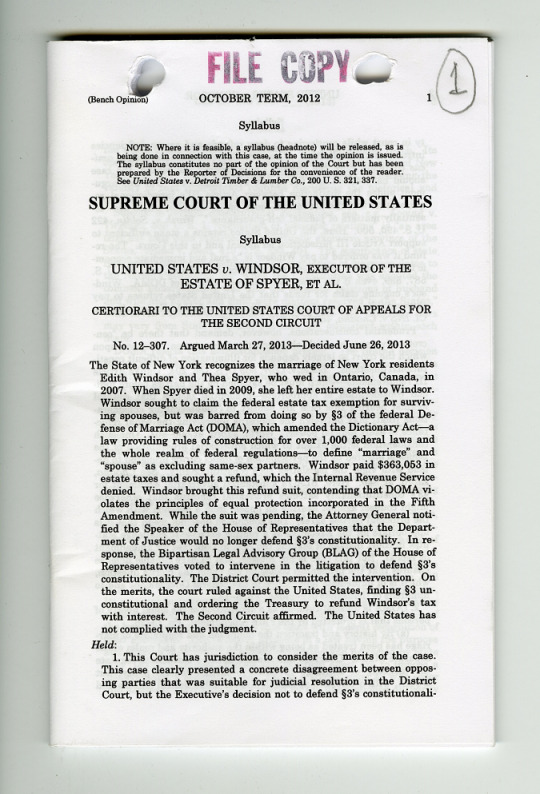
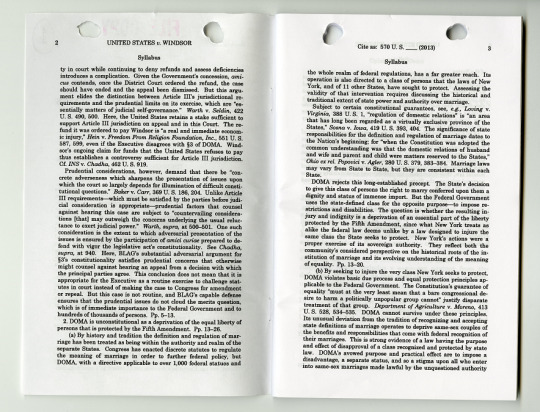
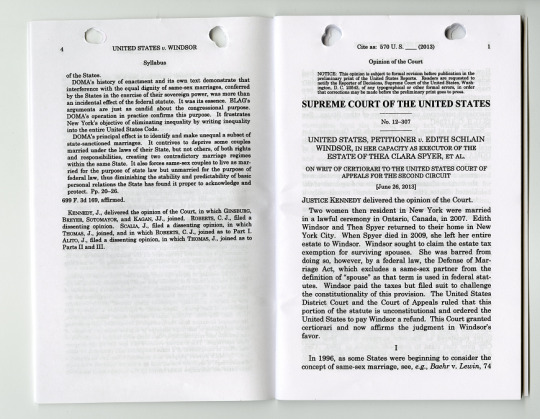
The Supreme Court ruled that the Defense of Marriage Act was unconstitutional on June 26, 2013.
In U.S. v Windsor, SCOTUS held that the federal government could not discriminate against same-sex couples.
Record Group 267: Records of the Supreme Court of the United States Series: Appellate Jurisdiction Case Files
Transcription:
[Stamped: " FILE COPY "]
(Bench Opinion) OCTOBER TERM, 2012 1 [Handwritten and circled " 1" in upper right-hand corner]
Syllabus
NOTE: Where it is feasible, a syllabus (headnote) will be released, as is
being done in connection with this case, at the time the opinion is issued.
The syllabus constitutes no part of the opinion of the Court but has been
prepared by the Reporter of Decisions for the convenience of the reader.
See United States v. Detroit Timber & Lumber Co., 200 U.S. 321, 337.
SUPREME COURT OF THE UNITED STATES
Syllabus
UNITED STATES v. WINDSOR, EXECUTOR OF THE
ESTATE OF SPYER, ET AL.
CERTIORARI TO THE UNITED STATES COURT OF APPEALS FOR
THE SECOND CIRCUIT
No. 12-307. Argued March 27, 2013---Decided June 26, 2013
The State of New York recognizes the marriage of New York residents
Edith Windsor and Thea Spyer, who wed in Ontario, Canada, in
2007. When Spyer died in 2009, she left her entire estate to Windsor.
Windsor sought to claim the federal estate tax exemption for surviv-
ing spouses, but was barred from doing so by §3 of the federal Defense
of Marriage Act (DOMA), which amended the Dictionary Act---a
law providing rules of construction for over 1,000 federal laws and
the whole realm of federal regulations-to define "marriage" and
"spouse" as excluding same-sex partners. Windsor paid $363,053 in
estate taxes and sought a refund, which the Internal Revenue Service
denied. Windsor brought this refund suit, contending that DOMA vi-
olates the principles of equal protection incorporated in the Fifth
Amendment. While the suit was pending, the Attorney General notified
the Speaker of the House of Representatives that the Department
of Justice would no longer defend §3's constitutionality. In re-
sponse, the Bipartisan Legal Advisory Group (BLAG) of the House of
Representatives voted to intervene in the litigation to defend §3's
constitutionality. The District Court permitted the intervention. On
the merits, the court ruled against the United States, finding §3 un-
constitutional and ordering the Treasury to refund Windsor's tax
with interest. The Second Circuit affirmed. The United States has
not complied with the judgment.
Held:
1. This Court has jurisdiction to consider the merits of the case.
This case clearly presented a concrete disagreement between oppos-
ing parties that was suitable for judicial resolution in the District
Court, but the Executive's decision not to defend §3's constitutionali-
[page 2]
2 UNITED STATES v. WINDSOR
Syllabus
ty in court while continuing to deny refunds and assess deficiencies
introduces a complication. Given the Government's concession, ami-
cus contends, once the District Court ordered the refund, the case
should have ended and the appeal been dismissed. But this argu-
ment elides the distinction between Article Ill's jurisdictional re-
quirements and the prudential limits on its exercise, which are "es-
sentially matters of judicial self-governance." Warth v. Seldin, 422
U. S. 490, 500. Here, the United States retains a stake sufficient to
support Article III jurisdiction on appeal and in this Court. The re-
fund it was ordered to pay Windsor is "a real and immediate econom-
ic injury," Hein v. Freedom From Religion Foundation, Inc., 551 U. S.
587, 599, even if the Executive disagrees with §3 of DOMA. Wind-
sor's ongoing claim for funds that the United States refuses to pay
thus establishes a controversy sufficient for Article III jurisdiction.
Cf. INS v. Chadha, 462 U. S. 919.
Prudential considerations, however, demand that there be "con-
crete adverseness which sharpens the presentation of issues upon
which the court so largely depends for illumination of difficult consti-
tutional questions." Baker v. Carr, 369 U. S. 186, 204. Unlike Article
III requirements---which must be satisfied by the parties before judi-
cial consideration is appropriate---prudential factors that counsel
against hearing this case are subject to "countervailing considera-
tions [that] may outweigh the concerns underlying the usual reluc-
tance to exert judicial power." Warth, supra, at 500-501. One such
consideration is the extent to which adversarial presentation of the
issues is ensured by the participation of amici curiae prepared to de-
fend with vigor the legislative act's constitutionality. See Chadha,
supra, at 940. Here, BLAG's substantial adversarial argument for
§3's constitutionality satisfies prudential concerns that otherwise
might counsel against hearing an appeal from a decision with which
the principal parties agree. This conclusion does not mean that it is
appropriate for the Executive as a routine exercise to challenge stat-
utes in court instead of making the case to Congress for amendment
or repeal. But this case is not routine, and BLAG's capable defense
ensures that the prudential issues do not cloud the merits question,
which is of immediate importance to the Federal Government and to
hundreds of thousands of persons. Pp. 5-13.
2. DOMA is unconstitutional as a deprivation of the equal liberty of
persons that is protected by the Fifth Amendment. Pp. 13--26.
(a) By history and tradition the definition and regulation of mar-
riage has been treated as being within the authority and realm of the
separate States. Congress has enacted discrete statutes to regulate
the meaning of marriage in order to further federal policy, but
DOMA, with a directive applicable to over 1,000 federal statues and
[NEW PAGE]
Cite as: 570 U.S._ (2013) 3
Syllabus
the whole realm of federal regulations, has a far greater reach. Its
operation is also directed to a class of persons that the laws of New
York, and of 11 other States, have sought to protect. Assessing the
validity of that intervention requires discussing the historical and
traditional extent of state power and authority over marriage.
Subject to certain constitutional guarantees, see, e.g., Loving v.
Virginia, 388 U.S. 1, "regulation of domestic relations" is "an area
that has long been regarded as a virtually exclusive province of the
States," Sosna v. Iowa, 419 U. S. 393, 404. The significance of state
responsibilities for the definition and regulation of marriage dates to
the Nation's beginning; for "when the Constitution was adopted the
common understanding was that the domestic relations of husband
and wife and parent and child were matters reserved to the States,"
Ohio ex rel. Popovici v. Agler, 280 U. S. 379, 383-384. Marriage laws
may vary from State to State, but they are consistent within each
State.
DOMA rejects this long-established precept. The State's decision
to give this class of persons the right to marry conferred upon them a
dignity and status of immense import. But the Federal Government
uses the state-defined class for the opposite purpose---to impose re-
strictions and disabilities. The question is whether the resulting injury
and indignity is a deprivation of an essential part of the liberty
protected by the Fifth Amendment, since what New York treats as
alike the federal law deems unlike by a law designed to injure the
same class the State seeks to protect. New York's actions were a
proper exercise of its sovereign authority. They reflect both the
community's considered perspective on the historical roots of the in-
stitution of marriage and its evolving understanding of the meaning
of equality. Pp. 13--20.
(b) By seeking to injure the very class New York seeks to protect,
DOMA violates basic due process and equal protection principles ap-
plicable to the Federal Government. The Constitution's guarantee of
equality "must at the very least mean that a bare congressional de-
sire to harm a politically unpopular group cannot" justify disparate
treatment of that group. Department of Agriculture v. Moreno, 413
U. S. 528, 534-535. DOMA cannot survive under these principles.
Its unusual deviation from the tradition of recognizing and accepting
state definitions of marriage operates to deprive same-sex couples of
the benefits and responsibilities that come with federal recognition of
their marriages. This is strong evidence of a law having the purpose
and effect of disapproval of a class recognized and protected by state
law. DOMA's avowed purpose and practical effect are to impose a
disadvantage, a separate status, and so a stigma upon all who enter
into same-sex marriages made lawful by the unquestioned authority
[page 3]
4 UNITED STATES v. WINDSOR
Syllabus
of the States.
DOMA's history of enactment and its own text demonstrate that
interference with the equal dignity of same-sex marriages, conferred
by the States in the exercise of their sovereign power, was more than
an incidental effect of the federal statute. It was its essence. BLAG's
arguments are just as candid about the congressional purpose.
DOMA's operation in practice confirms this purpose. It frustrates
New York's objective of eliminating inequality by writing inequality
into the entire United States Code.
DOMA's principal effect is to identify and make unequal a subset of
state-sanctioned marriages. It contrives to deprive some couples
married under the laws of their State, but not others, of both rights
and responsibilities, creating two contradictory marriage regimes
within the same State. It also forces same-sex couples to live as mar-
ried for the purpose of state law but unmarried for the purpose of
federal law, thus diminishing the stability and predictability of basic
personal relations the State has found it proper to acknowledge and
protect. Pp. 20-26.
699 F. 3d 169, affirmed.
KENNEDY, J., delivered the opinion of the Court, in which GINSBURG,
BREYER, SOTOMAYOR, and KAGAN, JJ., joined. ROBERTS, C. J., filed a
dissenting opinion. SCALIA, J., filed a dissenting opinion, in which
THOMAS, J., joined, and in which ROBERTS, C. J., joined as to Part I.
ALITO, J., filed a dissenting opinion, in which THOMAS, J., joined as to
Parts II and III.
[NEW PAGE]
Cite as: 570 U. S. _ (2013) 1
Opinion of the Court
NOTICE: This opinion is subject to formal revision before publication in the
preliminary print of the United States Reports. Readers are requested to
notify the Reporter of Decisions, Supreme Court of the United States, Washington,
D. C. 20543, of any typographical or other formal errors, in order
that corrections may be made before the preliminary print goes to press.
SUPREME COURT OF THE UNITED STATES
No. 12-307
UNITED STATES, PETITIONER v. EDITH SCHLAIN
WINDSOR, IN HER CAPACITY AS EXECUTOR OF THE
ESTATE OF THEA CLARA SPYER, ET AL.
ON WRIT OF CERTIORARI TO THE UNITED STATES COURT OF
APPEALS FOR THE SECOND CIRCUIT
[June 26, 2013]
JUSTICE KENNEDY delivered the opinion of the Court.
Two women then resident in New York were married
in a lawful ceremony in Ontario, Canada, in 2007. Edith
Windsor and Thea Spyer returned to their home in New
York City. When Spyer died in 2009, she left her entire
estate to Windsor. Windsor sought to claim the estate tax
exemption for surviving spouses. She was barred from
doing so, however, by a federal law, the Defense of Mar-
riage Act, which excludes a same-sex partner from the
definition of "spouse" as that term is used in federal stat-
utes. Windsor paid the taxes but filed suit to challenge
the constitutionality of this provision. The United States
District Court and the Court of Appeals ruled that this
portion of the statute is unconstitutional and ordered the
United States to pay Windsor a refund. This Court granted
certiorari and now affirms the judgment in Windsor's
favor.
I
In 1996, as some States were beginning to consider the
concept of same-sex marriage, see, e.g., Baehr v. Lewin, 74
#archivesgov#June 26#2013#2010s#Pride#LGBTQ+#LGBTQ+ history#U.S. v Windsor#Defense of Marriage Act#same-sex marriage#Supreme Court#SCOTUS
143 notes
·
View notes
Text











Video: Table News: Who needs Two Ears Anyway?
Status: Public
Link: Table News: Who needs Two Ears Anyway? - YouTube
Date Posted: literally today (July 22nd 2024)
#wttt#wttsh#welcome to the table#welcome to the statehouse#daily screenshot#wttt gov#wttt florida#wttt california#wttt texas#wttt supreme court#ya know what#i like ben as sup c too#is it just me or just sup c and aotj wear the same outfit#irl probs but i'm talking abt in canon not irl#remember another new table ep this week hopefully
17 notes
·
View notes
Text
the idea of project 2025 unfolding makes me nauseous
#just the other week we celebrated the anniversary of same sex marriage here in the us#and now there's a realistic chance it won't see another birthday next year#and the fact that the next supreme court justices will likely be young ultra conservative christian fundamentalists......#lifetime appointments y'all#even if we lose now and somehow return in 2028 the consequences will last for decades#and we can't afford that with the atrocities occuring here and worldwide#and with climate change
9 notes
·
View notes
Text
The fact that queerphobia is treated as “free speech” and being queer where other people can see is treated as a sex crime to be prosecuted by the fucking national government makes me want to bury myself in a hole and scream until I spit blood.
#mild vent#blood mention#yes this is about#kosa bill#stop kosa#fuck kosa#anti censorship#fuck the supreme court#fuck amerikkka#queerphobia#homophobia#queer#the same people begging the government to raise their kids for them#are the ones who don't want to pay taxes for community support#lgbtqia+#lgbtqia+ pride
43 notes
·
View notes
Text

I'll co-sign this and add it to the list of recommended Supreme Court books. I've read Supreme Conflict: The Inside Story of the Struggle for Control of the United States Supreme Court by Jan Crawford Greenburg (BOOK | KINDLE) and it's excellent and frighteningly prescient about what would happen ten years later under the successful Trump/McConnell push to finally reshape the Court and the federal judiciary, possibly for decades to come. And look at what that conservative-dominated Supreme Court has done in just the past three years.
#History#Books#Book Recommendations#Book Suggestions#Supreme Court#Judicial Branch#Judiciary#Federal Judiciary#Supreme Court Books#Supreme Conflict#Jan Crawford Greenburg#Hopefully we're talking about the same book!
41 notes
·
View notes